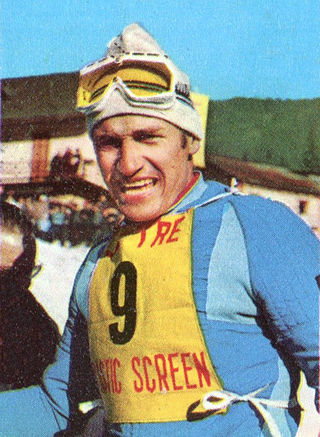| 1968 Men's Downhill World Cup | |
| Previous: 1967 | Next: 1969 |
Men's downhill World Cup 1967/1968
| 1968 Men's Downhill World Cup | |
| Previous: 1967 | Next: 1969 |
Men's downhill World Cup 1967/1968
| Round | Race No | Place | Country | Date | Winner | Second | Third |
|---|---|---|---|---|---|---|---|
| 1 | 3 | Wengen | January 13, 1968 | | | | |
| 2 | 5 | Kitzbühel | January 20, 1968 | | | | |
| 3 | 7 | Grenoble | February 9, 1968 | | | | |
| 4 | 10 | Chamonix | February 24, 1968 | | | | |
| 5 | 15 | Aspen | March 15, 1968 | | | |
Note: Round 3/Race 7 was the Olympic event, which counts also for the World Cup. See also 1968 Winter Olympics and Alpine skiing at the 1968 Winter Olympics
In men's downhill World Cup 1967/68 the best 3 results count. Deductions are given in ().
| Place | Name | Country | Total Points | Deduction | 3 | 5 | 7 | 10 | 15 |
|---|---|---|---|---|---|---|---|---|---|
| 1 | Gerhard Nenning | 75 | (2) | 25 | 25 | (2) | - | 25 | |
| 2 | Jean-Claude Killy | 60 | - | 20 | 25 | - | 15 | ||
| 3 | Karl Schranz | 39 | (8) | 20 | 11 | 8 | - | (8) | |
| 4 | Bernard Orcel | 37 | (3) | 4 | 8 | (3) | 25 | - | |
| Guy Périllat | 37 | 2 | - | 20 | 15 | - | |||
| Jean-Daniel Dätwyler | 37 | (3) | 11 | - | 15 | 11 | (3) | ||
| 7 | Heinrich Messner | 31 | - | - | 11 | - | 20 | ||
| 8 | Kurt Huggler | 20 | - | - | - | 20 | - | ||
| 9 | Edmund Bruggmann | 17 | 15 | 1 | 1 | - | - | ||
| Billy Kidd | 17 | - | 6 | - | - | 11 | |||
| 11 | Andreas Sprecher | 15 | - | 15 | - | - | - | ||
| 12 | Josef Minsch | 10 | 8 | 2 | - | - | - | ||
| Franz Vogler | 10 | - | - | - | 8 | 2 | |||
| Rudi Sailer | 10 | 3 | - | - | 6 | 1 | |||
| 15 | Dodge Phelps | 8 | - | - | - | - | 8 | ||
| 16 | Dumeng Giovanoli | 6 | 6 | - | - | - | - | ||
| Ivo Mahlknecht | 6 | - | - | 6 | - | - | |||
| 18 | Ludwig Leitner | 4 | - | 4 | - | - | - | ||
| Gerhard Mussner | 4 | - | 4 | - | - | - | |||
| Gerhard Prinzing | 4 | - | - | 4 | - | - | |||
| Hansjörg Schlager | 4 | - | - | - | 4 | - | |||
| Spider Sabich | 4 | - | - | - | - | 4 | |||
| 23 | Peter Rohr | 3 | - | - | - | 3 | - | ||
| 24 | Hans Zingre | 2 | - | - | - | 2 | - | ||
| 25 | Egon Zimmermann | 1 | 1 | - | - | - | - | ||
| Michel Dätwyler | 1 | - | - | - | 1 | - |
| Alpine skiing World Cup | |
| Men | |
Overall | Downhill | Giant slalom | Slalom | |
| 1968 |

Jean-Claude Killy is a French former World Cup alpine ski racer. He dominated the sport in the late 1960s, and was a triple Olympic champion, winning the three alpine events at the 1968 Winter Olympics, becoming the most successful athlete there. He also won the first two World Cup titles, in 1967 and 1968.

The FIS Alpine Ski World Cup is the top international circuit of alpine skiing competitions, launched in 1966 by a group of ski racing friends and experts which included French journalist Serge Lang and the alpine ski team directors from France and the USA. It was soon backed by International Ski Federation president Marc Hodler during the FIS Alpine World Ski Championships 1966 at Portillo, Chile, and became an official FIS event in the spring of 1967 after the FIS Congress at Beirut, Lebanon.

Downhill is a form of alpine skiing competition. Whereas the other alpine skiing events emphasize turning and technique, downhill emphasizes "the six components of technique, courage, speed, risk, physical condition and judgement", according to the FIS "International Ski Competition Rules (ICR)". Speeds of up to 130 km/h (81 mph) are common in international competition. Athletes must have an aerodynamically efficient tuck position to minimize drag and increase speed.

Giant slalom (GS) is an alpine skiing and alpine snowboarding competitive discipline. It involves racing between sets of poles ("gates") spaced at a greater distance from each other than in slalom but less than in Super-G.

The 40th World Cup season began in October 2005 and concluded at the World Cup finals in Åre, Sweden, in March 2006. The schedule included a nearly month-long break in February for the 2006 Winter Olympics in Torino, Italy.

Alpine skiing has been contested at every Winter Olympics since 1936, when a combined event was held in Garmisch-Partenkirchen, Germany.
The 28th World Cup season began in late October 1993 in Sölden, Austria, and concluded in March 1994 at the World Cup finals at Vail in the United States. The overall champions were Kjetil André Aamodt of Norway and Vreni Schneider of Switzerland.
The 10th World Cup season began in December 1975 in France and concluded in March 1976 in Canada. Ingemar Stenmark of Sweden won the first of his three consecutive overall titles. Defending women's overall champion Annemarie Moser-Pröll, who had won five straight overall titles, missed the entire season so that she could care for her father, who was terminally ill with lung cancer. In her absence, Rosi Mittermaier of West Germany, a double gold medalist at the 1976 Winter Olympics, won the women's overall title.
The 2nd World Cup season began in January in West Germany and concluded in April in the US Jean-Claude Killy of France repeated as the overall champion, and announced his retirement from World Cup competition. Nancy Greene of Canada repeated as the women's World Cup overall champion, and announced her retirement from World Cup competition.

Karl Schranz is a former champion alpine ski racer from Austria, one of the best of the 1960s and early 1970s.

Bernhard Russi is a former World Cup alpine ski racer from Switzerland. Born in Andermatt in the canton of Uri, he is an Olympic, World Cup, and World champion in the downhill event.
Marielle Goitschel is a French former alpine skier. Marielle is the younger sister of Christine Goitschel, another champion skier of the time, and the aunt of speed skier Philippe Goitschel.
Men's slalom World Cup 1967/1968
Women's Downhill World Cup 1967/1968

Guy Périllat Merceroz is a former World Cup alpine ski racer from the resort of La Clusaz, Haute-Savoie, one of the top ski racers of the 1960s.
William Besse is a Swiss former alpine skier. He took four wins and 13 podiums in the FIS Alpine Ski World Cup, all of them in the downhill discipline, including winning the Lauberhorn downhill in Wengen in 1994. He retired from competition in 1999, in part because he struggled to adapt to the introduction of carving skis in the mid-1990s. After retiring from competition, he became a ski instructor in Verbier, and also worked as an analyst for Télévision Suisse Romande and Radio Télévision Suisse's coverage of alpine skiing, until he was let go after the 2014-15 season.
For the 1992 Winter Olympics in Albertville, France, a total of thirteen sports venues were used. Val-d'Isère has been part of the Alpine Skiing World Cup since the late 1960s while Tignes served as host of the first Freestyle World Ski Championships in 1986. Most of the venues used were constructed between 1987 and mid 1990 with the test events taking place in late 1990 and early 1991. It was the last Winter Olympics with an outdoor speed skating rink which led to weather issues for three of the ten events. Three cross-country skiing events were run in snowstorms while the men's 20 km biathlon was found to be 0.563 km (0.350 mi) too short. The downhill events in alpine skiing were criticized for being too steep. Freestyle skiing made its official debut at these games with the men's winner being stormed after his win while the women's winner won her event in a snow storm. La Plagne hosted the skeleton World Championships in 1993 while Val-d'Isère hosted the Alpine World Ski Championships in 2009.
Gerhard Nenning was an Austrian former alpine skier who competed in the 1964 Winter Olympics and 1968 Winter Olympics.
The Men's Downhill competition of the Grenoble 1968 Olympics was held at Chamrousse on Friday, 9 February.
The Women's Downhill competition of the Grenoble 1968 Olympics was held at Chamrousse on Saturday, 10 February.